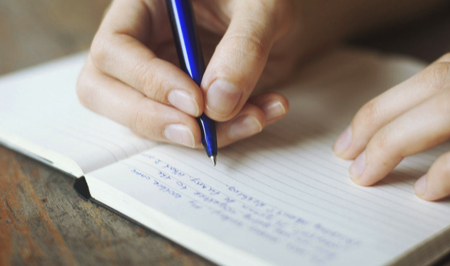Topic “Handwriting” often appears in IELTS Speaking Part 1. This is not a tough topic, but to be able to answer this part correctly, you need a good vocabulary and the ability to develop natural ideas.
In this article, readingielts.com will share with you sample questions and answers topic Handwriting to help you prepare for the IELTS Speaking Part 1.
IELTS Speaking Part 1 Topic Handwriting
QUESTIONS AND ANSWERS
1. Do you often write things?/ Do you like to write by hand?
I prefer typing most of the time, but I think there’s something nice about handwriting. When I’m trying to plan something out, I’ll always write my thoughts down in a notebook. It makes me feel more organized. Plus, handwriting is a nice personal touch when you’re giving someone a card for their birthday or another occasion.
2. Do you think handwriting is important?
I think handwriting is somewhat important. When you’re giving someone a gift, it’s nice to handwrite a card so they feel special. Handwritten letters are also a great way to show someone that you care. I’ve also heard that handwriting your notes will help you memorize the content better. So for some purposes, it’s definitely important.
3. Which do you prefer, handwriting or typing?
I usually prefer typing. I like handwriting, but for the most part, using a computer is way faster and more convenient. For example, if I’m writing an essay for school, it would take me away too long to try and write it out. My hand gets cramps when I try to write for that long. Typing is a lot easier.
4. What’s the difference between handwriting and typing?
Well, handwriting is definitely more personal. Everyone has a unique style of handwriting, so it’s kind of like putting your personality on a page. Typing is much more efficient though. Even if you’re slow at typing, chances are that you’ll get more done than if you were writing by hand.
Some IELTS Speaking part 1 topics you may like:
- (2024) IELTS Speaking Part 1 Topic Getting lost – Free Lesson
- (2024) IELTS Speaking Part 1 Topic Study – Free Lesson
- (Update 2024) IELTS Speaking Part 1 TV program Free
- (Update 2024) IELTS Speaking Part 1 Topic Cars Free
- (Update 2024) IELTS Speaking Part 1 Topic Writing Free Lesson
Other questions
1. Do you think computers might one day replace handwriting?
(Answer) I don’t think so.
(Explain) It’s true that the computer has been doing a good job in helping people to write. However, I don’t think that it will totally replace the traditional way of writing as there will be no computers to rely on in urgent cases.
2. When do children begin to write in your country?
(Answer) Vietnamese kids start learning to write at the age of around 5 to 6,
(explain) which is considered quite early by some European experts. But Vietnamese kids know how to do it well actually.
3. What impression does a person’s handwriting have on other people?
I think handwriting can be a rich source for analysis. Even if you are not a specialist, you can determine what a person is like by looking at their handwriting means a person who is difficult to understand, while neat writing is sure to signify order. The most obvious characteristic is the size of the letters. Large letters may mean someone is generous, whereas small letters mean a person is introverted or thrifty.
4. Nowadays, how do most people write things?
I’m convinced that most people have turned in to typists due to modern technology even when it comes to writing quick notes, reminders and to-do lists, the majority of people use their devices as sticky notes always fall off and get lost. At the same time, using an electronic device, you can store them in the cloud and be sure they will be there unless you delete them which, thank god, can’t happen accidently. Also, you can make them private and nobody will be able to open them with a password.
5. Do you think Handwriting is important nowadays?
I don’t even doubt that it still remains important in education, business and everyday life, despite many people believe it’s a thing of the past. For example, most exams in my country are still hand written and you’ll be marked down if your handwriting id illegible. Also, it’s by far the best form of note taking. Most of us take phone messages, job down notes in meetings create drafts of important documents solely by hand.
6. How did you learn to write?
As far as I remember, it took me awhile until I could produce recognizable letters. But it was fun as my mom was resourceful and turned this seemingly borning activity into a game. I remember writing letters, or something I thought was letters, in the air, in the sand and salt. Also, my mom wrote down letters using sport and faint lines so that I could retrace over them. At the next stage I watched my mom write down letters and tried to copy them so by the time went to school, I could write in block letters.
7. How can children today improve their handwriting?
In my opinion, the only way to do it is through lots of practice. The more a child writes, the better they become at it.
8. Do you like writing things when you were a child?
Oh, I really enjoyed it. Writing something calmed me down and helped me relax so I tried to get down to it whenever I had a spare moment. The moment the pencil touched the paper, the words practically flew from it and I set out for the land of my dreams. It was an amazing experience.
VOCABULARY
1. To sharpen a skill:
To sharpen my communication skills, I participate in a lot of extra-curricular activities.
2. To rely on: dựa vào.
I don’t think we should always rely on theories in books because there are many unexpected situations which cannot be solved by them in real life.
You can find out more information about IELTS Speaking Part 1 at the British Council website:
https://takeielts.britishcouncil.org/take-ielts/prepare/free-ielts-practice-tests/speaking/part-1

